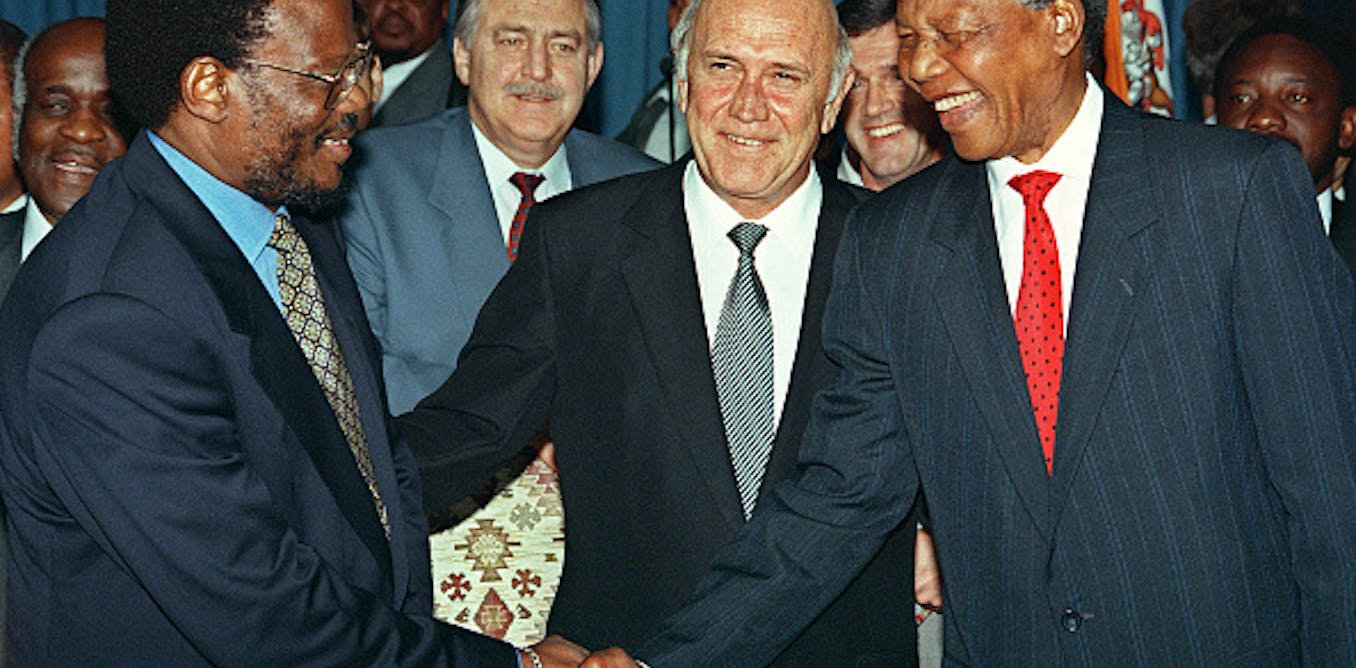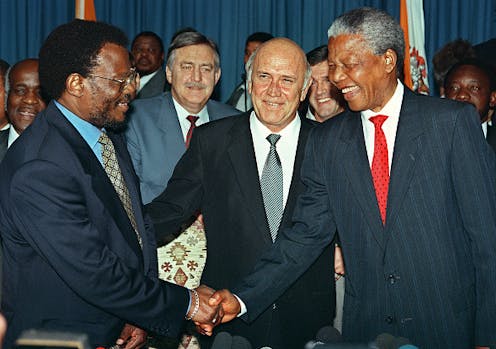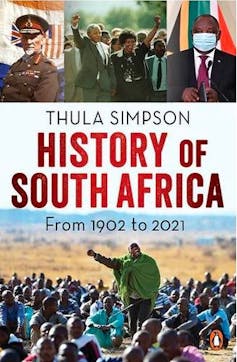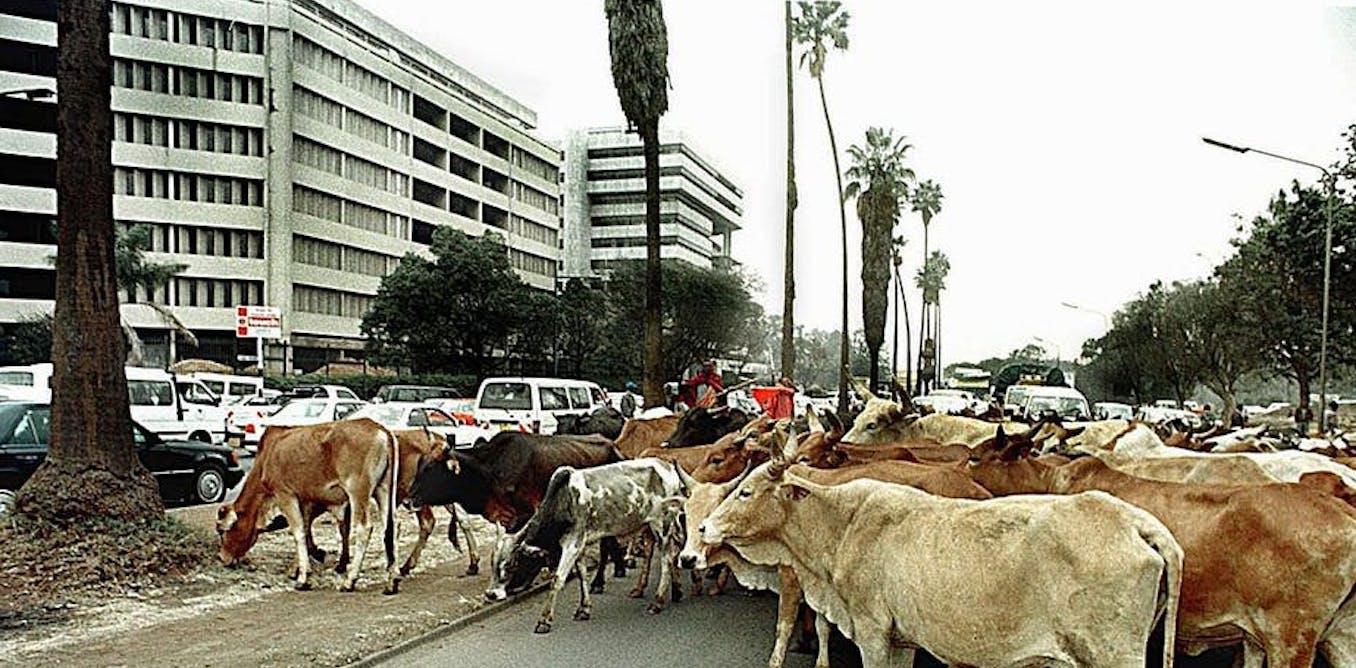New book on South Africa's history puts black people at the centre, for a change
This history covers twelve decades, from the surrender of Boer guerrillas in the Second Anglo-Boer War in 1902 to the July 2021 looting spree and violence.


Thula Simpson’s new book, History of South Africa from 1902 to the Present, is an event-packed narrative history. It is reminiscent of the style of Eric Walker’s History of Southern Africa eight decades ago – a very influential book, prescribed for many university history classes – except this time black South Africans are central to the story, not confined to its margins.
The author, an associate professor at the University of Pretoria, most recently published the book, Umkhonto we Sizwe: The ANC’s Armed Struggle, in 2016. This was also written in an event-by-event narrative style.
The author’s choice of 1902 as his starting point is presumably because from then on South Africa was under one political ruler – first, the British imperial government; then white settlers; and since 1994, majoritarian democratic rule. The trade-off for dense detail of twentieth century is that the reader forgoes older periods that haven’t received much attention.
A wealth of archaeological research has breathed life into thousand year old trade routes, and the Bokoni, a pre-colonial mixed farming society, from the 1500s and other forgotten kingdoms and chiefdoms.
This history covers twelve decades, from the surrender of Boer guerrillas in the Second Anglo-Boer War in 1902 to the July 2021 looting spree in two of South Africa’s provinces. Usefully, this history provides the results of every election since 1910. As the publisher’s blurb states,
the book follows the South African people through the battles, elections, repression, resistance, strikes, insurrections, massacres, economic crashes and health crises that have shaped the nation’s character.
This book is new scholarship, which fills a gap with the release of new documents.
This history traces that as far back as the Versailles peace conference of 1919, to settle the post - World War 1 arrangements. Rival delegations to the conference came from the South African Native National Congress (today South Africa’s governing ANC) and JBM Hertzog’s Nasionale Party, to lobby for opposite causes. Both lobbied in vain the British Prime Minister Lloyd George: the one for an Afrikaner republic; the other to defend the Cape franchise for blacks.
Capturing history
This historical narrative covers the Bulhoek massacre in 1921, about a church stand to keep their meeting ground, but ignores the 1922 Bondelzwart rebellion against the South African Government imposing a sixfold increase in their effective taxes.
It covers the crushing of the 1922 Rand revolt against hiring African miners instead of higher paid white miners, and the Pact government’s legislative victory for the defeated white mine workers. The Pact government was constituted by an Afrikaner majority, with support from English-speaking white mineworkers. This was about firing black workers in skilled jobs. It also reminds one of the statutory anti-Semitism of the 1930 Quota Act, which dramatically blocked Jewish refugees’ emigration to South Africa, as did the Aliens Act of 1937.
This book is a good reminder that, notwithstanding Prime Minister Jan Smuts’ “segregation has fallen on evil days” speech in 1942, (p.131), his government subsequently repealed not one segregation law. But, to the contrary, it added to segregation laws against Indians, while a parliamentary Marriage Commission proposed in 1939 a ban on interracial marriages (p.162). This was immediately implemented by the apartheid regime in 1949.
The decades of struggle between the apartheid government and the African National Congress, Pan-Africanist Congress of Azania, Azanian People’s Organisation, the South African Communist Party, and trade unions are chronicled, culminating in the mass struggles for freedom of the 1980s, and the fraught negotiations of 1990-93 to end apartheid.
The current struggles by the families of killed detainees to get prosecution of torturers from the Special Branch – the notorious apartheid police unit – makes topical this books’ reminder that President F W de Klerk’s last action in office was to grant amnesty from prosecution to Adrian Vlok, Magnus Malan, apartheid police and military leaders, respectively, and 3,500 policemen and others, for atrocities committed to uphold apartheid. (p.352)
The winning of democracy a generation ago fills seven chapters. With hindsight, we can assess the consequences that in 1997 Jacob Zuma was appointed to head the ANC cadre deployment committee: (p.373) chapter 29 is titled Captive State.
The ANC will look back to its 2009 election peak of 70% of votes; the opposition Democratic Alliance will similarly recall its 2014 election peak of 22% of the votes, reaching 30% in Gauteng. (pp. 404, 421)
Criticism
Inevitably, a six hundred page history book will have a few mistakes.
Walvis Bay in Namibia, then South West Africa under South African rule, was not conquered by South Africa in 1914 as claimed on page 47. It was annexed to the Cape Colony in 1884, as Simpson himself writes on page 243.
The Special Branch was not founded “about 1935” (p.150): United Party cabinet minister Harry Lawrence ordered it set up in 1947. Before that, Criminal Investigation Department detectives did political snooping, ever since the International Socialist League of the Cape Colony in the 1900s.
In 1968, University of Cape Town (UCT) appointments did not have to be confirmed by the government (p.216). The government threatened that it would extend the apartheid colour bar to academic posts unless the UCT Council rescinded its appointment of Archie Mafeje. Mafeje, a black man, was an emerging scholar who became a major academic critic of the discipline of social anthropology itself.
There will always be more facts than there is space for. But this history should have mentioned that the Liberal Party by 1960, and the Progressive Federal Party by 1979, had updated their policies to accept universal franchise. Also, bar the Yu Chi Chan Club, there is not even one sentence on any organisations of the Non-European Unity Movement family. Their activists influenced the boycott strategy of the South African Non-Racial Olympic Committee.
Bleak conclusion
This history paints a bleak conclusion to its twelve decades: xenophobic “pogroms and lynching had become a routine feature of South African life” from 2008 (p.400) with poor blacks attacking other poor blacks. A 153-day strike became the longest ever in South African mining history (p.415) in 2012, and we witnessed the Marikana massacre in 2012.
Chapter 30 is titled False Dawn in its summary of President Cyril Ramaphosa’s difficult first years in power. COVID-19 and the lockdowns culminated in the KwaZulu-Natal and Gauteng looting spree of July 2021, mixing opportunism and Zuma diehards incensed by his incarceration for contempt of court.
But it’s not all bad. South Africa spends 45% of its annual budget on the poorest 40% of its citizens. (p.393). Its constitutional democracy, and enforceable Bill of Rights, remain rare beacons on the African continent. Corruption triggered a huge backlash, including Ramaphosa’s appointment of new prosecutors.
If this history book runs to a second edition in a decade’s time (as Eric Walker’s did) we will await with interest any revision of its conclusions, which are that South Africa is on a downward path.
This is a thorough, fact-packed history that deserves to be in every school library and on every home bookshelf.
History of South Africa from 1902 to the Present is published by Penguin Random House.![]()
Keith Gottschalk is a member of the ANC, but writes this review in his professional capacity as a political scientist.
What's Your Reaction?































































































